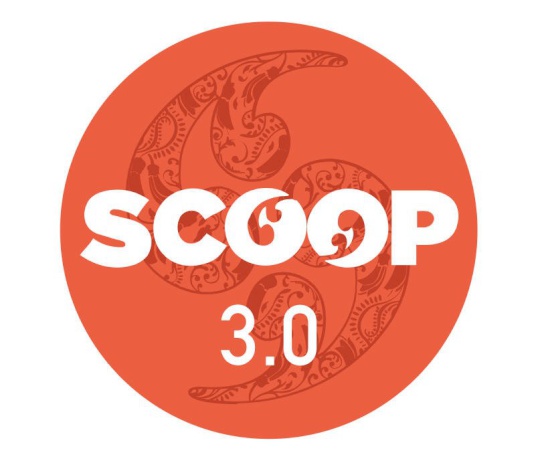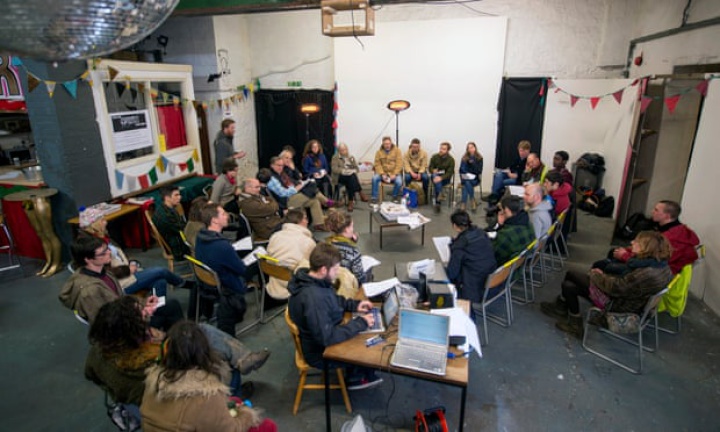2018 has been quite a year for Scoop. We are so thrilled to have successfully met the funding target for the first stage of the ‘Scoop 3.0’ plan raising $36,000. This means we can now proceed with the planning phase for the delivery of this bold vision in 2019. Thankyou to all our supporters who donated or spread the word about this cause and to all the organisations that purchased ScoopPro licenses. It truly was a collective effort befitting a community focused media project such as this, and we are humbled to be supported by such a caring and committed community of Kiwis.

Most of all we are thrilled at the positive support and feedback we have received from you - our community. This validates the idea we have that a community owned and participation oriented independent newsroom for New Zealand is something people are excited about supporting. In fact, during the campaign I wrote a piece entitled Why We Care About Scoop which quoted a number of ‘Scoop 3.0’ donors saying in their own words why they were donating and why they believe Scoop is important. The fact that over 260 of you donated to the campaign, and over 25 new organisations joined ScoopPro on the strength of this plan indicates that there is a significant groundswell of support for our ambitious 2019 goals. We aim to continue to grow this support into an unstoppable wave of solidarity for truly independent journalism through a larger crowd equity raise next year.

What is crowd
equity?
Equity crowdfunding helps businesses harness the power of their crowd to raise capital. This means that in 2019 Scoop will be able to use a different type of PledgeMe campaign to exchange shares for investment in the enterprise. This means you - our community become shareholders and ambassadors for Scoop and have a say in the ongoing running of the organisation and share in any potential benefits accruing to shareholders. We hope to raise at least half a million dollars through this campaign which will allow us to deliver on the innovative and expensive aspects of the ‘Scoop 3.0’ campaign to develop Scoop’s tech infrastructure. This type of campaign is regulated by the Financial Markets Conduct Act 2014 and you can read more information on the PledgeMe site here.
As an example PledgeMe, themselves raised $628,390 in crowd equity earlier this year in a successful crowd equity campaign to expand their operation to Australia and upgrade the platform. In the Media space, The Bristol Cable in the UK is a co-operatively owned and collaboratively run by 20,000 community members. This upstart is blazing a new trail and showing how beneficial community ownership and an open/participatory approach to journalism can be. New Internationalist is another UK media enterprise that has successfully transitioned to a community owned co-operative model through a crowd equity raise. Between 1 March and 6 April 2017, 3,409 people invested £704,114 (US$879,000) via their Buy into a better story campaign. This was the biggest media community share offer in history. ‘Scoop 3.0’ will be the first New Zealand example of a media organisation offering the community an ownership stake, and we hope it will represent a big shift in the paradigm of what is possible for the New Zealand media sector which is commonly regarded as one of the most centralised and corporate owned Media in the world. See the latest NZ Media Report from JMAD.

Bristol Cable members’ meeting. Photograph: Adrian Sherratt for the Guardian
Next Steps - Laying the foundations
for Scoop 3.0
This $36,000 raised in the Scoop 3.0 campaign is a much needed and welcome raindrop in the bucket of what is still a mammoth financial task ahead of us in reaching a sustainable and thriving position.
We still have much work to do before we are in a position to deliver fully on the Scoop 3.0 plan. A key part of this journey is therefore to reach our target of having 300 registered ScoopPro organisations. This will give us the financial stability and certainty to take the risky step of overhauling our software and adopting new features. Our business case and the software that we hope to build as part of Scoop 3.0 relies on this continued financial revenue form professional users as its customers.
A hugely positive aspect of the ‘Scoop 3.0’ campaign is that through crowd selling via PledgeMe, we have managed to grow our ScoopPro licensed commercial user base. We are now up to 226 ScoopPro licensed organisations - over ¼ of the way to the target from our 2018 starting point of 200 organisations.
Some of the more notable clients that joined the ScoopPro family during the 2018 campaign include:
• Auckland University,
• Universities New
Zealand Te Pokai Tara,
• The New Zealand Human
Rights Commission,
• The Commission for Financial
Capability (CFFC),
• Z Energy,
• Greenpeace,
• The NZ Shipping Federation,
• The Auckland
Business Chamber,
• NZ Kindergartens
The smaller organisations that also joined ScoopPro in the campaign were:
Emerge Aotearoa, The Good South,
Kiwiwallet, Expand PR, Ōmaka Aviation Heritage
Centre,
Grow, Parent to Parent, Alcohol Healthwatch,
ClosingTheGapNZ, SwayTech, Storicom,
Boyes PR, COMET
Auckland, HWPL, Flexigroup, Michael Webb - Barrister, Oratia
Media
Sojol, Whānau Manaaki Kindergartens, GoodSense,
Māui and Hector's Dolphin Defenders and
Electricity
Networks Association.
Auckland University is the second major New Zealand University to join ScoopPro as a licensed organisation (after AUT) and we really welcome this brave move on their part. We hope this development puts the pressure on the other majors to follow this example of respecting Scoop’s claim to the copyright over information we publish, particularly Victoria University, University of Otago, Massey, University of Waikato and Canterbury University.
ScoopPro subscriptions now provide almost all of Scoop’s annual income, this revenue is repeatable, and broad based and once it reaches a sustainable level with provide us with a stable base for growth. And that will make Scoop.co.nz very unusual in global media terms. While there are some news organisations with very large paywall subscriber bases - e.g. the New York Times, Wall Street Journal and Washington Post, and others with large donor/member bases, e.g. the Guardian nearly all digital only publishers are completely dependent on advertising revenues.
For Scoop our Scoop Pro licensees are the canopy of mighty rakau that provides the shelter, nutrients and space for a thriving media ecosystem to emerge from beneath. However, Scoop is far from out of the financial undergrowth yet.
As a result, we recently announced our intention to extend the Scoop 3.0 Discount offer until the end of the year. If you know of any organisations who are likely to use Scoop professionally please pass on this article or this link to ScoopPro: pro.scoop.co.nz
Also, to this end we plan to keep up the public pressure about our message of the damage caused by freeriding. This project and the survival of the Scoop infrastructure is an important community asset and public good worth protecting.
Both I and Alastair Thompson wrote during the PledgeMe campaign about the damage being caused to Scoop by the ongoing Freeriding of large organisations who refuse to acknowledge their liability to adhere to our terms and conditions of commercial use.
The first piece was my Stop Freeriding: Help Scoop Survive (and Thrive!).
This article contains an ethical and legal exploration of the right of Scoop to assert copyright over content on our platform and the danger to the sustainability of public goods caused by freeriding (i.e. the use public resources by organisations or individuals who do not pay a share in supporting said resources.)
Next, Alastair Thompson published his two open letters to the readers and NZ's Professional Communications Community, the core professional users of Scoop.
The first letter was It's Crunch Time For Scoop.co.nz - An Open Letter To Readers.
This letter laid out the reality that Scoop's services are not currently sustainable, and unless they become so in a relatively short space of time - we will be unable to continue to provide them.
Our crowdfunding result gives us some breathing room - and the number of licenses we sold during the campaign as particularly encouraging - however it does not alter the very real and present danger that Scoop faces. We need to reach the target of 300 ScoopPro license holders to give ourselves a steady and stable income that will enable us to pay all our core team to continue running the Scoop operation. At present our sales and technical teams are supported by volunteers, and this is not sustainable.
The second piece by Alastair Thompson was Open Letter Part 2: Who Are Scoop's Biggest Freeriders?
This article was essentially a no-holds-barred broadside at the larger companies using Scoop without a license. As an exemplar Alastair provided Scoop’s usage statistics for Scoop’s biggest ‘freeriders’ in the Government, University, Banking and Media sectors. In doing so he pointed out that the media’s failure to comply with Scoop’s “ethical paywall” is something of an own goal. While all NZ media companies are desperate to find a new way to finance journalism, they are also ignoring a solution which is in plain sight.
It is particularly unconscionable for such organisations as the Government and Universities to fail to comply with our clearly stated terms of copyright because they should understand the importance of intellectual property and the public good of freely available public interest media better than most institutions. However, as mentioned above Auckland University has subsequently become licensed. Clearly this article demonstrated the moral and legal imperative for them to do so. We hope that the other majors will follow suit within time.
Every company that uses Scoop professionally and gets value from doing so would hold a ScoopPro license. This may be wishful thinking, however even if only ¼ of those companies do comply, we would have more than sufficient revenue to start expanding our public interest independent media coverage and spreading the idea to other independent media organisations in New Zealand.
The ScoopPro concept is really pretty simple and far from novel now, as we have been actively asserting these terms for over three years. Much like a Creative Commons Non-commercial license, all content on Scoop is free for reading by the public for non-commercial purposes, however is subject to certain restrictions for professional users. These restrictions are that such is is permitted only by organisations holding the appropriate ScoopPro license for their organisation type. Simple right? Well it does not seem to be simple enough for a vast majority of organisations who continue to ignore our requests that they purchase a license.
Let’s be clear, we are not even talking big money here. For most organisations this starts at 250 per year, and for larger ones a little more, and this includes other beneficial media tools that we throw in at no extra charge. In the scheme of content subscription rates, this is a drop in the bucket, so the ongoing wilful ignorance of those large organisations in the Government, Media, Education and Banking sectors is particularly grating.
Despite this, it seems there are enough organisations with ethically minded people in the right positions that recognise the value of Scoop and an independent public interest focused media platform for New Zealand. Our Licenses are still selling and we are on track to reaching our target of 300 organisations next year if this rate continues. This, in combination with opening up Scoop to Community ownership through equity crowdfunding, and hopefully a few new sponsors for Scoop’s main sections will put us in a financial position better than the vast majority of New Zealand and global media organisations. This is why we are extremely optimistic about the opportunities for Scoop in 2019. We are not claiming it will be an easy road, however there is a very clear path and working together in a transparent and collaborative manner we can create a stable media ecosystem of real value for New Zealand’s future generations.



 DC Harding: In The Spirit Of Natural Justice
DC Harding: In The Spirit Of Natural Justice Martin LeFevre - Meditations: Animal Encounters During Meditative States
Martin LeFevre - Meditations: Animal Encounters During Meditative States Ian Powell: Gisborne Hospital Senior Doctors Strike Highlights Important Health System Issues
Ian Powell: Gisborne Hospital Senior Doctors Strike Highlights Important Health System Issues Keith Rankin: Who, Neither Politician Nor Monarch, Executed 100,000 Civilians In A Single Night?
Keith Rankin: Who, Neither Politician Nor Monarch, Executed 100,000 Civilians In A Single Night? Eugene Doyle: Writing In The Time Of Genocide
Eugene Doyle: Writing In The Time Of Genocide Gordon Campbell: On Wealth Taxes And Capital Flight
Gordon Campbell: On Wealth Taxes And Capital Flight